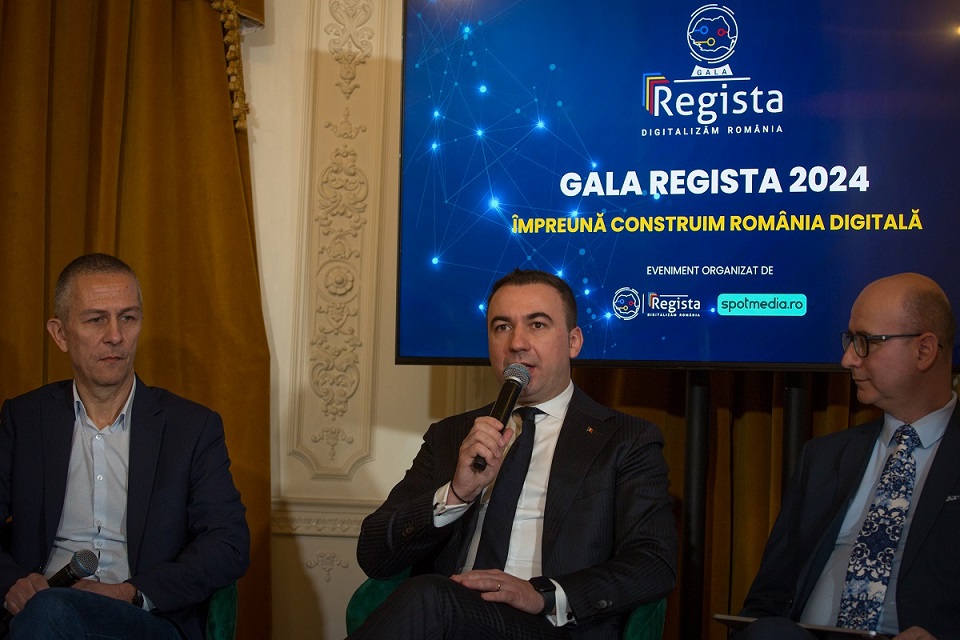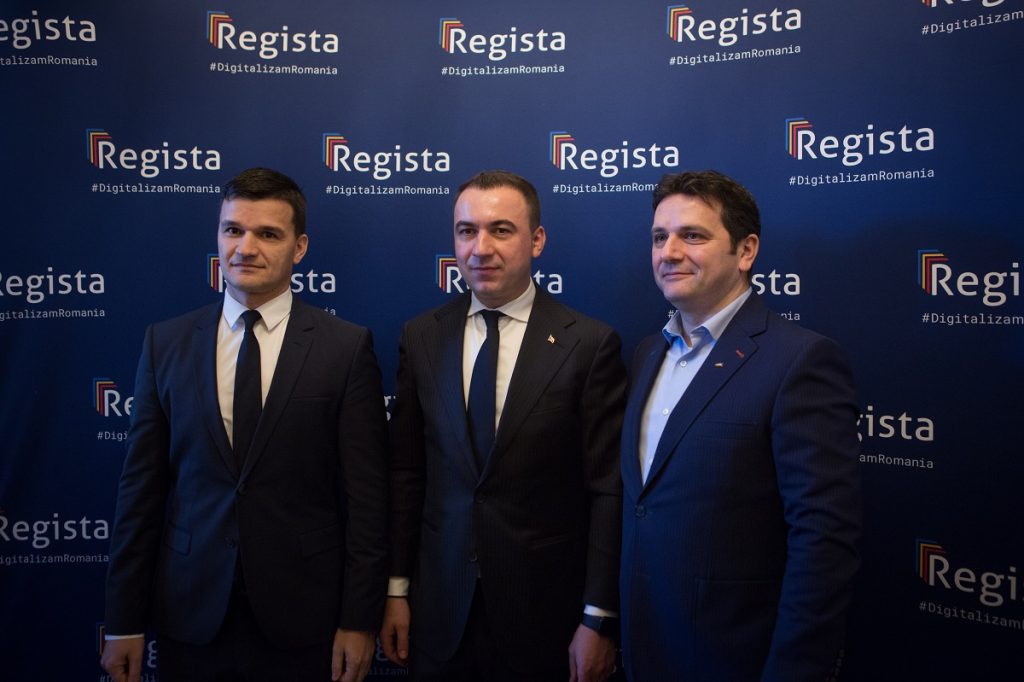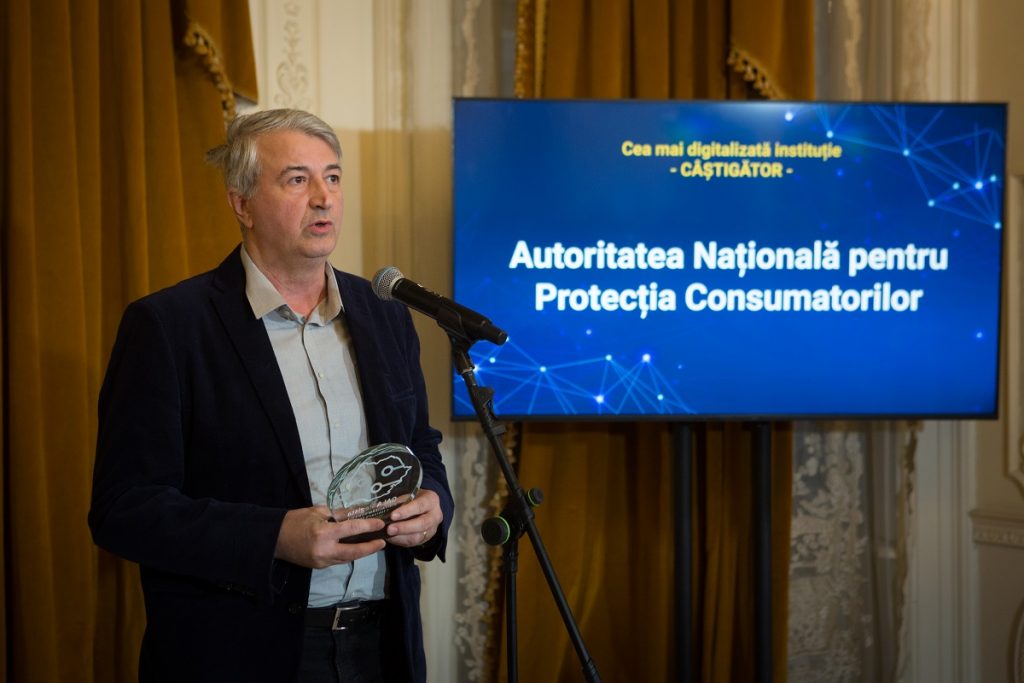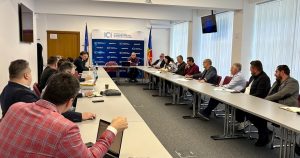Gala Regista 2024: The starting point in the partnership between the private sector and the state for the efficient digitization of Romania

Regista, the solution for automating and streamlining processes in public institutions and private companies in Romania, part of the Zitec group, organized the third edition of the Regista Gala – Together we build Digital Romania. The purpose of the event was to reward the public institutions with the most relevant digital progress in Romania.
The gala also hosted two debates on the topic of digitalization, to which the Minister of Research, Innovation and Digitalization, the President of ADR and other important voices from the public and private environment contributed. The digitization trend remains strongly upward at the European level, and Romania is no exception. Although our country still ranks last in the DESI ranking, there are equally opportunities for digital progress in Romania. Regista, through the slogan #DigitalizamRomania, repeated also in the third edition of the Gala, makes sustained efforts, together with its clients from the whole country, to make real contributions to increasing the degree of digitization.

The Minister of Research, Innovation and Digitization, Bogdan-Gruia Ivan, was present at the Regista Gala, in the opening of which he mentioned the fact that the state and the private sector must work together on a solid partnership for Romania’s digital development: “Romania’s huge potential in the segment IT&C, including in the area of cybersecurity, must not be just a statement, but a certainty for anyone who comes to do business or be a digital nomad in our country. I invite you to be partners because the state, regardless of the country, will not have the same agility as the private industry”.
As in previous years, Gala Regista awarded public institutions with outstanding progress in digitization, in one of the following seven categories, whose winners are:
- Bucharest University Emergency Hospital – for the institution with the best presence on social networks
- Năvodari City Hall, Constanta – for the institution with the best digital interaction with citizens
- National Authority for Consumer Protection – for the most digitized institution
- Pantelimon Town Hall, Constanța – for the most digitized town hall
- Târgu Bujor Town Hall, Galati – for the most digitized town hall
- Petrol – Gas University, Prahova – for the most digitized educational institution
- Veterinary Sanitary and Food Safety Directorate, Argeș – for the most important digital progress

The prizes awarded by the Register of Public Institutions above are offered based on objective selection criteria. These involve the automatic extraction of data from internal reports on the use of the Regista solution, depending on the modules, type and number of documents run, users and requests.
The award for the most important digital progress represents Regista’s direct appreciation of the Romanian public institution that made the greatest contribution to the development of platform solutions. The interest in the digitization of internal processes is increasing in Romania and not only in the case of town halls.
Although UATs continue to represent the majority percentage of the Regista portfolio, the year 2023 has also attracted the interest of educational institutions and hospital units. The role of the Registry, and implicitly of digitization, is also noticeable in the case of other types of public institutions.

The National Authority for Consumer Protection, the most digitized institution in 2023, and the Argeș Veterinary and Food Safety Directorate, which won the award in the most important digital progress category, are just 2 of the examples that show that digitization can be done where it exists vision and interest in improving the quality of life of citizens.
“It matters a lot how we continue to #DigitalizeRomania; progress can be seen at the grassroots, both in the largest cities and in the smallest communes in the country. The most important message for 2024 is that in the age of digitization, the partnership between the private sector and the state becomes vital. Only through collaboration and joint innovation can we win the digital battle. The private sector brings agility, creativity and expertise, while the state provides the necessary legal framework, infrastructure and resources. It’s time to join forces to turn this challenge into an opportunity and ensure a prosperous digital future for citizens”, said Edward Crețescu, General Manager Regista.
The two debates within the Regista 2024 Gala dealt with the progress of digitization in Romania, but also the effects this process has on society. The guests took turns to discuss the current level of digital infrastructure in the country, but also to make an x-ray of the degree of digitization in the public administration, compared to that in the private system. The topic of cyber security in the age of digitization was also touched upon, discussing risks, but also strategies for protecting data.

The speakers also talked about the impact of digitization in the labor market, but also at the academic level, among schools and universities. The guests who took the floor were Bogdan-Gruia Ivan, Minister of Research, Innovation and Digitization, Dragoș Cristian Vlad, president of the Authority for Digitization of Romania, Iulian Stanciu, executive president of eMAG, Bogdan Putinică, General Manager of Microsoft Romania, Radu Burnete, director of the Employers’ Federation Concordia, Eduard Dumitrașcu, president of the Romanian Smart City Association, Alex Șelaru, founder of edus.ro, Marcel Bartic, history teacher at Evrika School, Alexandru Lăpușan, CEO & Founding Partner Zitec, and Edward Crețescu, General Manager Regista. The discussions were moderated by Radu Puchiu, co-founder of Tinia Group and Andreea Paul, Dr. Economist, Conf. Univ. ASE, President of INACO, and the gala was presented by Teddy Păun, journalist and radio moderator.
The debates started from the idea that there are still deficiencies regarding the degree of citizens’ understanding of digitalization, showing that it is a good time for this abstract concept to be clearly explained to people:
“Digitalization should be properly explained to the general public. We are in an election year, there will be a lot of political talk, and digitalization will not be a topic that anyone can come forward with and win the elections. I think it is also our job, the industry’s, but also the job of those in the administration to start humanizing this digitization, “look, Mrs. Rodica has more time to stay with her child in the park because she has paid her taxes”, so that people to understand and say “yes, I understand, I accept and I really want digitization”, said Iulian Stanciu, executive president of eMAG.
The guests also spoke about the political will at the national level regarding the adoption of digital solutions and the convergence of the private and public areas:
“Digitalization in Romania can be accelerated in a fairly simple way. I think that the political will in Romania is starting to have coherence and convergence regarding digital technologies and how they can be used. Digitization is not about buying a laptop and a printer; services, especially those put at the service of the citizen, to make his life easier, to generate economic progress and to accelerate education. But there is a difference between vision, strategy and execution. Calling on normal competitive practices, obstacles should no longer be put in the way of these projects to absurdly delay them at the moment when we need them so much”, said Bogdan Putinică, General Manager of Microsoft Romania.
In addition, the employers’ vision regarding the digitalization situation was also mentioned:
“There is no lack of dialogue between the private and public environment. But two things are happening: first of all, we have a much too high speed of drafting public policies and governance, so there is no time to have a substantive dialogue. I would like to take time to understand the issues and have a fruitful exchange of ideas. The second difficult issue when it came to digitalization was the fact that the political parties lacked not only the will, but also a vision of what the administration is and should be in Romania. I think that for many, the administration was seen as a tool that serves the decision-maker, and the politicians only saw it from this angle. However, things are starting to change and we are starting to move towards the angle where the administration also serves the citizen”, said Radu Burnete, director of the Concordia Employers’ Federation.
“Yes, we still have 23 months until implementation; since June 2022 we have regulated a lot, and I am glad that now we can give a signal that we want a full-stack cloud technology in the government cloud, to work and give a certainty that we can develop and respond to the needs. We cannot be in place of Estonia tomorrow, but we will have data sovereignty. The Estonians succeeded also because they set, since the fundamental laws, the use of a single source of truth for the population record. IT is not very complicated if you have the «as is» done, and ADR, together with its partners, managed to make an «as is». Basically, we don’t give a black box that needs to be opened and deciphered”, concluded Dragoș Cristian Vlad, president of the Authority for the Digitization of Romania.
















